Photographs: Reuters A K Bhattacharya
Singur in West Bengal is where Mamata Banerjee's battle against the Left Front gained a decisive edge.
The question that many observers of Bengal politics may be asking today is whether Singur will also mark the beginning of Banerjee's political downfall.
The question may appear premature since Banerjee has not even completed two months after recording a convincing victory in the Assembly polls in May, bringing to an end the 34-year-long Left Front rule in the state.
Yet, it would be instructive to evaluate how Singur even in this short time has enmeshed her government in all kinds of avoidable controversies.
. . .
Why Singur is important
Image: Singur farmers.Within months of the Left Front's victory in the Assembly polls in 2006, the re-elected chief minister of the state, Buddhadeb Bhattacharjee, had invited the Tatas to set up their factory to produce Nano from West Bengal.
Since the Tatas had the option of setting up the Nano factory in Uttaranchal as well, the West Bengal government offered many concessions in a bid to win the project for the state.
There were also murmurs of protest over the manner in which the state government went ahead with the deal.
. . .
Why Singur is important
Image: Tata Nano factory in Singur.That, however, did not stop the Tatas from acquiring 997 acres of land in Singur, though a little less than 20 per cent of the farmers who had to give up their land for the small-car project refused to accept the compensation cheques the state government had issued.
Over time, this became the nucleus of a movement against Tata Motors' Singur project, spearheaded by none other than Ms Banerjee and her party, Trinamool Congress.
The Tatas were keen to have the entire land allotted to them, while Ms Banerjee wanted the government to return the land belonging to reluctant farmers, estimated at around 300 acres.
. . .
Why Singur is important
Image: Unfinished Singur factory.With no resolution in sight, the Tatas decided to pull out from Singur in October 2008, even though by then they had almost commissioned the small car project and had even rolled out a car.
Not surprisingly, therefore, one of Banerjee's poll promises was to return the Singur land to the farmers.
That was a significant promise and was indicative of the importance she herself accorded to the Singur agitation.
. . .
Why Singur is important
Image: A farmer at the Singur site.Photographs: Parth Sanyal/Reuters
It was a decision taken in a hurry.
It was bad in law, because the Assembly was technically in session.
The Left Front leaders, who lost the elections to the Trinamool Congress just a few days ago, sensed an opportunity to regroup and lead a delegation to register its protest over the ordinance with the Governor.
. . .
Why Singur is important
Image: The interior of the Tata Motors' plant in Singur.Photographs: Reuters
Banerjee realised the mistake, put the ordinance on hold and got a new legislation passed by the Assembly soon after it convened.
Even before the Tatas could challenge the new legislation forcing them to return the land, the state government started the process of re-possessing it.
The Tatas went to court and obtained a stay on repossession until the court gave its verdict.
A few questions arise. Banerjee gained more popularity among the Singur farmers?
That seems unlikely.
. . .
Why Singur is important
Image: West Bengal Chief Minister Mamata Banerjee at a rally in Singur.Photographs: Reuters
Remember that of 13,350 farmers, who gave up their land, only around 2,300 farmers with about 300 acres of land were reluctant to accept the compensation package.
If the government returns the entire land, how would those farmers who had given up the land after accepting the compensation react to the new development?
Many of them have plots of land adjacent to the disputed site and were earlier expecting an appreciation in their value after the Tata Motors factory became operational.
Now that there is no hope of any project coming up there, would they be happy with Ms Banerjee?
. . .
Why Singur is important
Image: Singur residents take part in a rally in support of Nano.Photographs: Reuters
Also, if the Singur land, where the Tata Motors factory had come up, is returned to farmers, what can they do with that land?
The top soil of almost the entire 997 acres is now damaged, making immediate farming there almost unviable.
Farmers will first have to invest a lot in that land to make that cultivable. So, giving the land back in that condition is not likely to solve the farmers' problems.
Could Ms Banerjee have handled the Singur issue differently?
. . .
Why Singur is important
Image: Tata Group chairman Ratan Tata with Nano.Photographs: Reuters
The Tatas had written to the government saying that they would vacate the land if compensation was paid to them.
According to various estimates, the compensation would range between Rs 440 crore or Rs 4.4 billion (if only the value of the investment made in Singur is calculated) and Rs 1,400 crore or Rs 14 billion (if everything including the goodwill cost, factory shifting expenses etc is estimated).
If Banerjee had gone to Singur and in a public meeting announced that she would pay up Rs 1,400 crore to the Tatas, what would have been the Tatas' response?
. . .
Why Singur is important
Image: Policemen with riot gear stand guard inside the entrance of Nano factory.Photographs: Jayanta Shaw/Reuters
The Tatas would have had no option but to accept the compensation and give up the land. Would that course be better than the one Banerjee has chosen now?
With a long-drawn-out court battle likely now, the Singur issue will continue to simmer for many more months.
Farmers will not be happy with this.
Nor will the industry, which would be wary of making investments in the state, given what happened to the Tatas.
So, should it be surprising if Singur marks the decline in Banerjee's popularity and becomes the rallying point for political parties opposed to her?

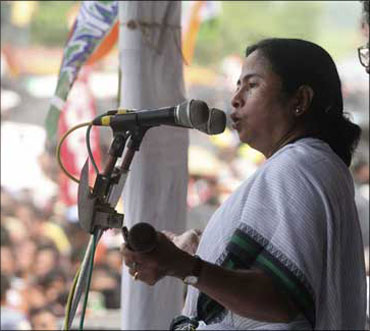
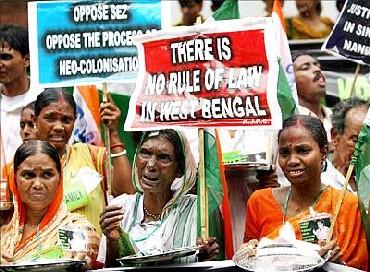
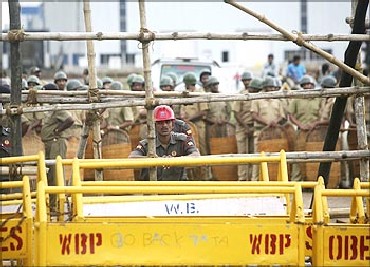
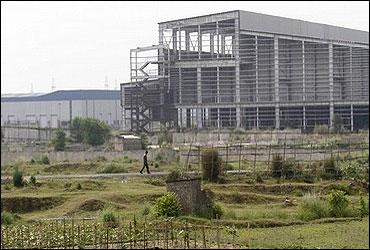
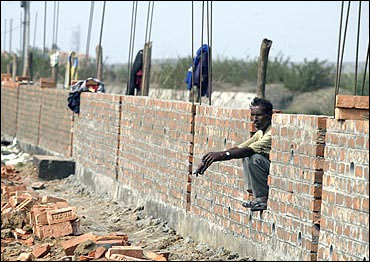
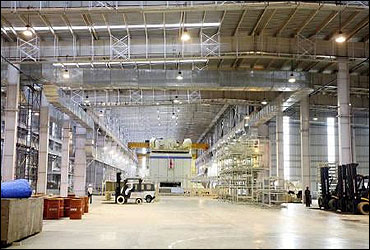
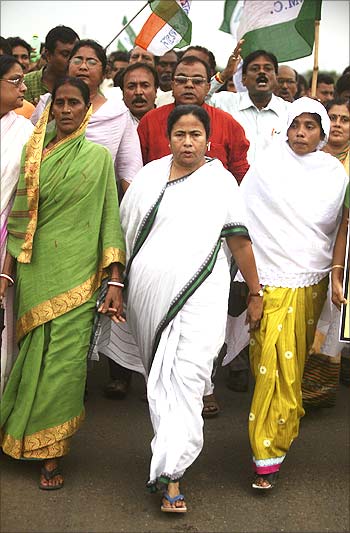
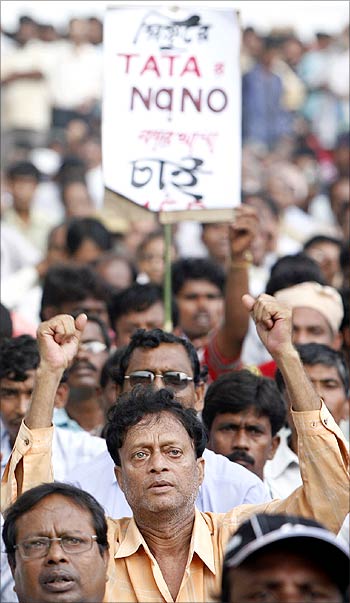
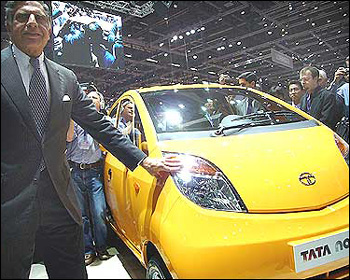
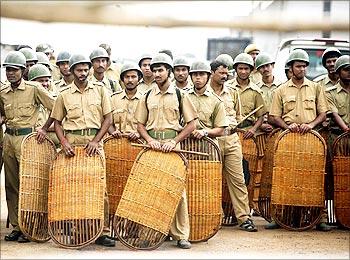

article